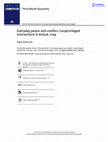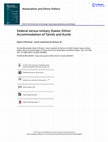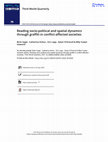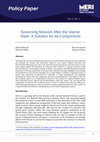Peer-Reviewed Articles by Dylan O'Driscoll

Third World Quarterly, 2021
Taking as a starting point the conviction that everyday interactions carry the potential to be ei... more Taking as a starting point the conviction that everyday interactions carry the potential to be either conflictual or peaceful, this article examines people's everyday behaviour in the deeply divided city of Kirkuk, Iraq. Using the historic bazaar in Kirkuk city as a site of analysis, and through a research survey of 511 people, it focuses on interactions between Kurds, Arabs and Turkmen. The article draws on Bourdieu's theory of symbolic capital and takes an intersectional approach to analyse the everyday interactions in the bazaar to create a better understanding of the role of space and privilege. The results demonstrate that for the most part, at the everyday level people carry out acts of everyday peace rather than conflict. However, when everyday conflict does occur, those with the highest symbolic capital are the most likely actors. Additionally, although gender does influence people's actions, ethnosectarian identity has greater influence in many areas related to everyday peace and conflict. On a practical level, the article argues that such an understanding can connect better to policymaking and peacebuilding as it can point to where and how peacebuilders should focus their attention in order to promote and enhance peace within people's everyday lives.

Nationalism and Ethnic Politics, 2020
This article contributes to the debate on whether federalism leads to ethnic accommodation and is... more This article contributes to the debate on whether federalism leads to ethnic accommodation and is peace-preserving through comparing the methods of ethnic accommodation in federal and unitary states. Rather than focusing on a large dataset, this article offers an in-depth picture of the role the two systems play in ethnic accommodation, offering a more nuanced understanding. The Kurds (Iraq and Turkey) and Tamils (India and Sri Lanka) have been chosen as they form territorial minorities in both federal and unitary states. The article suggests that federalist states offer a degree of acceptance toward political, cultural and economic equality with ethnic minorities. However, federalism may not be the cause of ethnic accommodation; it may be on the one hand the expression of a state willing to concede cultural, political and economic equality to an ethnic minority, or on the other hand induce such behavior. Thus, federalism without recognition of such equality does not guarantee ethnic accommodation.

Third World Quarterly, 2020
This paper argues that graffiti can provide a form of socio-political commentary
at the local lev... more This paper argues that graffiti can provide a form of socio-political commentary
at the local level, and is a valuable, yet often overlooked,
resource for scholars and policymakers in conflict-affected societies.
Graffiti, in its many forms, can provide rich insight into societies, cultures,
social issues, trends, political discourse, and spatial and territorial identities
and claims. Thus, this, paper suggests that graffiti is a valuable
source of knowledge in societies undergoing social and political transformation,
to hear the voices of those often left out from the official
discourses. Despite advances in the field of arts and international relations
and the focus on the local and the everyday, peace and conflict
scholarship and policy still lack systematic engagement with arts-based
contributions and how to read them. The paper attempts to address
this gap by outlining four core dimensions to consider when attempting
to interpret and decode graffiti: the spatial, temporal, political economic
and representative dimensions. This can also be viewed as an inquiry
into the where, when, who and what. These four elements make up an
analytical guide and enable scholars to better understand graffiti, and
its political meaning and messaging.

International Political Science Review, 2019
This article brings the case of the Kurdish referendum for independence into the wider literature... more This article brings the case of the Kurdish referendum for independence into the wider literature on independence referendums. It examines the decision to hold an independence referendum and explores the pre-referendum conditions and the post-referendum consequences. The article argues that the referendum in the Kurdistan Region of Iraq was held due to internal political competition and party politics rather than the ripeness of the timing for independence. Theoretically, this article adds a new dimension to the scholarship on independence referendums, as it demonstrates that the purposes of independence referendums can go beyond the question put to the population – such as consolidating popular support by connecting to the population’s nationalist desires, despite independence not being a realistic prospect. Finally, it brings further support for previous findings of the importance of international support for independence referendums.

This article examines the practices and narratives of inclusion and exclusion in Iraq in relation... more This article examines the practices and narratives of inclusion and exclusion in Iraq in relation to ethnic and religious minorities displaced by the Islamic State and the resulting war. Examining the displacement in Iraq through the lens of citizenship, and utilising 29 in-depth qualitative interviews with internally displaced people (IDPs) in the Kurdistan Region of Iraq, this article argues that displacement has been accompanied by practices and narratives meant to include internally displaced people in a particularistic articulation of belonging rather than to ensure a substantive participation as Iraqi or Kurdistan Region of Iraq citizens. Rhetoric of citizenship in Iraq changes between civic and ethnosectarian belonging based on conflict dynamics and the competition for power, whilst remaining ethnosectarian in reality. Thus, internally displaced people and their citizenship have become entangled in wider ethnosectarian competition in Iraq, and narratives and practices of citizenship change to fit the objectives of these wider actors, mainly Baghdad and Erbil, rather than being based on inclusiveness and civic identity.

Using the case study of the Kurdistan Region of Iraq (KRI) and the 2017 independence referendum, ... more Using the case study of the Kurdistan Region of Iraq (KRI) and the 2017 independence referendum, this article examines the nexus between independence referendums, nationalism and political power. It argues that the referendum in the KRI was held due to internal political competition and growing rebellion from the population against the poor economic performance and political situation rather than because the time was right for independence referendum. Focusing on the poor political and financial dynamics, as well as the lack of regional and international support for Kurdish independence, the article argues that independence was not a realistic goal and was rather used as a distraction amid internal turmoil. The example of the referendum in the KRI poses questions about the democratic credibility of such referenda, as the population were voting for an unachievable result and the referendum itself became a tool of internal political competition.
The physical reconstruction needs are staggering . The United Nations Special Envoy has estimated... more The physical reconstruction needs are staggering . The United Nations Special Envoy has estimated the cost of rebuilding Syria at $250 billion but some estimates go as high as $1 trillion . In Yemen, the ongoing war has brought more than a third of the population to the brink of starvation while the World Bank has assessed the cost of physical rebuilding at some $40 billion . In Libya, reconstruction actually means building new state institutions and reconciling the country's disparate social groups .
There has been a failure to address the future of Kirkuk through political means, whilst tensions... more There has been a failure to address the future of Kirkuk through political means, whilst tensions are once again coming to the fore there is a real risk that Kirkuk’s future will be decided by force. This article examines the political options available for Kirkuk based on the resolution of similar issues of conflict in Northern Ireland and Brčko, Bosnia and Herzegovina. Based on the advances made in these cases the article suggests that exogenous actors will have to play a role in reaching an agreement in Kirkuk, that a special status for Kirkuk is necessary, and that power sharing needs to be properly institutionalised.
With IS nearing its territorial defeat, the time has come to address the repercussions of its ris... more With IS nearing its territorial defeat, the time has come to address the repercussions of its rise — the prominent role the PMF now has in Iraqi society being one of the most dangerous elements that need to be countered. This article aims to briefly highlight the danger the PMF poses to Iraqi unity, before going on to argue for the best way to counteract this threat within the current political dynamics of Iraq. In the context of this article, Iraqi unity refers to preventing Iraq from failing as a state and fragmenting into small ethnoreligious territories. It requires the different communities to opt for cooperation rather than competition with one another and for the government to develop an inclusive system of governance based on citizenship and respect for the human rights of all groups.
Regional autonomy is guaranteed in the constitution of Iraq, yet between 2006 and 2014 the Shiite... more Regional autonomy is guaranteed in the constitution of Iraq, yet between 2006 and 2014 the Shiite prime minister at the time, Nouri al-Maliki, did his utmost to limit the power of both Kurds and Sunnis. Maliki worked to further centralise governance and amassed greater controls and power—from militarily to legislative—for his party. Instead of strengthening and securing Iraq, Maliki's actions have led to a rise in both Kurdish and Sunni nationalisms, which has resulted in civil war and the effective failure of the Iraqi state. This article analyses how Maliki's actions enabled the rise of the Islamic State, and have changed the dynamics of Iraq. It proposes that, in light of these changes, the best way forward for the effective running of the country is the implementation of federalism across Iraq.

This article argues that the political and security marginalization of the Sunnis is partly respo... more This article argues that the political and security marginalization of the Sunnis is partly responsible for the rise of IS; thus, any liberation would be counterproductive if not paired with a political and security agreement for Mosul and the wider province of Nineveh. It thus lays out the issues that need to be, and should already have been, addressed. As the battle for Mosul is likely to take as long as three months, and possibly even more, it is vital that negotiations begin and agreements are reached for the political and security elements of the liberation before it is completed. I will first contextualize the political failures in Iraq by examining the marginalization of Sunnis. Following this, I will analyze why it is essential for a political and security deal to be reached prior to the completion of the liberation of the city of Mosul and what role the coalition forces, particularly the United States, can play in facilitating this arrangement.

This article examines the role that the US’ intransigent foreign policy played in the creation of... more This article examines the role that the US’ intransigent foreign policy played in the creation of the critical state Iraq now finds itself in. It also analyses the influence recent changes to US polices may play in the restructuring of the Iraqi state. Since the 2003 invasion the US has backed a centralised Iraq and its over-commitment to this solution blinded it to the unconstitutional acts and growing authoritarianism under Nuri al-Maliki. It took the rise of the Islamic State for the US to finally change their policies away from championing a strong centralised state and towards a more federal Iraq. At the same time, US foreign policy in Iraq does not have the leverage it once had, with Iran – who still favours a centralised state – having far more influence. Correspondingly, this article argues that the US completely misunderstood the situation in Iraq and their diminishing influence compounds this mistake. It also makes it harder for the US to play a major role in bringing about the much-needed changes to the Iraqi political system.
This article examines the historical process of the demise of Gaelic in Ireland due to the polici... more This article examines the historical process of the demise of Gaelic in Ireland due to the policies developed by England, and compares this to the process Kurdish is currently undergoing in Turkey. This comparison accentuates the threat that Kurdish is facing and demonstrates that it is in danger of being eradicated. Through highlighting the similarities in the policies used by both England and Turkey to eradicate ethnic threats through assimilation, and the speed in which this process is happening in Turkey, this article determines that Kurdish has reached an important stage and that the actions over the next few decades will decide its future.
Iraq is currently witnessing the highest levels of violence since 2008 and with the failure to ad... more Iraq is currently witnessing the highest levels of violence since 2008 and with the failure to adequately adjust the election laws the ethnic and sectarian violence is only set to increase following the 2014 elections. This paper examines the core political factors that have contributed to the escalation of violence and the intensification of the conflict following the last national elections in 2010. It also analyses potential changes to the election laws that could solve many of the issues highlighted and thus reverse the escalation of violence.
Policy Reports by Dylan O'Driscoll

SIPRI Policy Paper 56, 2020
Nearly a decade after the Arab Spring, the substantial political change that many across the Midd... more Nearly a decade after the Arab Spring, the substantial political change that many across the Middle East and North Africa (MENA) have hoped for has yet to be seen. In fact, as the 2019 wave of protests shows, street protests continue to endure in the region, often over the same recurring issues.
This paper takes a regional approach to understanding the state of the social contract in MENA countries. It describes, country-by-country, the impact of protest movements, or their absence, on relations between society and the state, and the likely effect of the COVID-19 pandemic on those relations. It then examines the roles and impact of external actors, and the attitudes that they have adopted towards protests.
Based on this analysis, the authors recommend that the European Union (EU) adopts a new approach to regional security and stability that takes the needs of the populations as the starting point. This would involve a broader EU agreement on priorities in MENA that emphasize aspects that answer those needs.
SIPRI Policy Paper, 2019
This paper takes a local turn to the study of peace and conflict in Kirkuk, examining opportuniti... more This paper takes a local turn to the study of peace and conflict in Kirkuk, examining opportunities and providing recommendations for peacebuilders to focus interventions on the local everyday level. As such it represents a shift in research on Kirkuk, which up until now has focused heavily on the elite level. Through using the bazaar as a site of study this paper offers a unique insight into the daily interactions in Kirkuk and gives a much-needed understanding of community relations and the factors that influence them, as the basis for practical policy recommendations.
This report views the Hashd al-Shaabi (Popular Mobilisation Forces, PMF) as having played an intr... more This report views the Hashd al-Shaabi (Popular Mobilisation Forces, PMF) as having played an intrinsic role in the provision of security in Iraq since the dramatic rise of the Islamic State (IS). However, through the lens of nationalism it analyses the negative role the PMF may play once IS is defeated. The report therefore presents suggestions to deal with the perceived threat of the PMF in the short to medium term.
Policy Papers by Dylan O'Driscoll

This paper lays out three administrative options for the post-Islamic State governance of Nineveh... more This paper lays out three administrative options for the post-Islamic State governance of Nineveh and analyses the benefits and drawbacks related to each option. Despite minorities and international lobbying groups tied to the minorities favouring separate minority provinces, this paper argues against the formation of a Nineveh Plain province. A separate province would prevent efforts for reconciliation, is likely to induce new conflicts, and will ultimately not benefit minorities in the ways proponents of the plan claim. Similarly, the paper highlights that although decentralisation to the province through Law 21 could address a number of important issues, it would leave minorities in Nineveh too vulnerable to being marginalised and politically dominated by Sunnis. The main argument, and thus recommendation, of the paper is that the best available option for all components of Nineveh is the creation of a Nineveh federal region with entrenched power sharing and decentralisation within the region. This will provide the components of Nineveh with a political arena in which to address and overcome differences, while protecting minorities as well as Sunnis from being marginalised. Moreover, the creation of a region for Nineveh will have a stabilising effect on the wider Iraqi political system.
Following the 2015 national election in Turkey the AKP, for the first time since coming to power ... more Following the 2015 national election in Turkey the AKP, for the first time since coming to power in 2002, failed to win enough votes to form a majority government. Since the election the AKP has given the impression that it is attempting to form a coalition government, but in reality the party has been employing a number of tactics in order to increase its share of the vote in preparation for a snap election. These tactics have mainly revolved around increasing the nationalist vote and damaging the main Kurdish party. However, these manoeuvres have increased polarisation in Turkey and have resulted in an escalation of the conflict with the Kurds. Worryingly, it has become evident that the AKP aims to win power in the next election at all costs.











Uploads
Peer-Reviewed Articles by Dylan O'Driscoll
at the local level, and is a valuable, yet often overlooked,
resource for scholars and policymakers in conflict-affected societies.
Graffiti, in its many forms, can provide rich insight into societies, cultures,
social issues, trends, political discourse, and spatial and territorial identities
and claims. Thus, this, paper suggests that graffiti is a valuable
source of knowledge in societies undergoing social and political transformation,
to hear the voices of those often left out from the official
discourses. Despite advances in the field of arts and international relations
and the focus on the local and the everyday, peace and conflict
scholarship and policy still lack systematic engagement with arts-based
contributions and how to read them. The paper attempts to address
this gap by outlining four core dimensions to consider when attempting
to interpret and decode graffiti: the spatial, temporal, political economic
and representative dimensions. This can also be viewed as an inquiry
into the where, when, who and what. These four elements make up an
analytical guide and enable scholars to better understand graffiti, and
its political meaning and messaging.
Policy Reports by Dylan O'Driscoll
This paper takes a regional approach to understanding the state of the social contract in MENA countries. It describes, country-by-country, the impact of protest movements, or their absence, on relations between society and the state, and the likely effect of the COVID-19 pandemic on those relations. It then examines the roles and impact of external actors, and the attitudes that they have adopted towards protests.
Based on this analysis, the authors recommend that the European Union (EU) adopts a new approach to regional security and stability that takes the needs of the populations as the starting point. This would involve a broader EU agreement on priorities in MENA that emphasize aspects that answer those needs.
Policy Papers by Dylan O'Driscoll
at the local level, and is a valuable, yet often overlooked,
resource for scholars and policymakers in conflict-affected societies.
Graffiti, in its many forms, can provide rich insight into societies, cultures,
social issues, trends, political discourse, and spatial and territorial identities
and claims. Thus, this, paper suggests that graffiti is a valuable
source of knowledge in societies undergoing social and political transformation,
to hear the voices of those often left out from the official
discourses. Despite advances in the field of arts and international relations
and the focus on the local and the everyday, peace and conflict
scholarship and policy still lack systematic engagement with arts-based
contributions and how to read them. The paper attempts to address
this gap by outlining four core dimensions to consider when attempting
to interpret and decode graffiti: the spatial, temporal, political economic
and representative dimensions. This can also be viewed as an inquiry
into the where, when, who and what. These four elements make up an
analytical guide and enable scholars to better understand graffiti, and
its political meaning and messaging.
This paper takes a regional approach to understanding the state of the social contract in MENA countries. It describes, country-by-country, the impact of protest movements, or their absence, on relations between society and the state, and the likely effect of the COVID-19 pandemic on those relations. It then examines the roles and impact of external actors, and the attitudes that they have adopted towards protests.
Based on this analysis, the authors recommend that the European Union (EU) adopts a new approach to regional security and stability that takes the needs of the populations as the starting point. This would involve a broader EU agreement on priorities in MENA that emphasize aspects that answer those needs.
See more here: https://www.academia.edu/28571168/ODriscoll_Dylan._2016_The_Future_of_Mosul_Before_During_and_After_the_Liberation._MERI_Policy_Report_pp._1-60
Please join us on 4 March at 18:30 for our Obi Igwara Memorial Lecture. This year's lecture will be given by Dr. Heike I. Schmidt (University of Reading). Her lecture is entitled 'Nationalism in Africa: Aspiration, Self-Improvement and Belonging’. The lecture will be chaired by Dr. Michael Amoah (SOAS) and will be in room 5.02, Clement House, LSE.
The Obi Igawara Memorial Lecture was instituted in 2004 by ASEN as an occasion to remember Dr Obi Igwara, one of the founders of ASEN, and of its journal, Nations and Nationalism. Obi was born in Nigeria in 1955. She did her doctoral dissertation in the Department of Sociology, LSE. Her thesis was on the role of religious identification in contemporary Nigeria. She was killed in a car accident while on a visit to Nigeria in April 2002. She was a devout Catholic and gifted with a tremendously charismatic and radiant personality. She had a fearlessly critical mind and her entrepreneurship and dynamism were like the forces of nature.
Best wishes,
ASEN
PLEASE SUBMIT YOUR ABSTRACT ONLINE BY 15 DECEMBER 2014:
http://asen.ac.uk/submit-an-abstract/